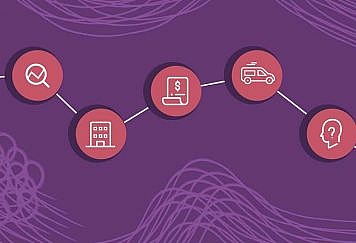One of the most famous sayings goes, “health is wealth.” And it is incredibly accurate, as our healthy minds and bodies drive us forward to pursue our life goals. However, if someone gets ill, they want the best healthcare to continue their daily activities. As of now, the ongoing medical practices and services that patients receive globally can be divided into main categories i.e.
- Medical treatment
- Surgical treatment, and
- Psychiatric treatment
Like everything else, these three medical services have also been affected by technology greatly. The extensive digitization and use of IT within the healthcare systems have made a lot of [processes smooth and removed various hindrances that were creating hindrances for the patients in receiving their treatment.
Is Digital Health The Future Of Healthcare?
This question is still a matter of wide speculation. Although many people and medical professionals consider digital health the ultimate future of healthcare, some people remain skeptical. One of the main reasons for this skepticism, for example, is the ethical concerns regarding surgical operations done on patients by robots.
Another important factor in answering this question is the ordinary people’s slow adoption of digital healthcare technologies. Other significant challenges in digitizing healthcare systems are data integration across various platforms and delivering patient-centered care.
How Can We Create A More Valued Digital Ecosystem In Healthcare?
To create a highly functional digital ecosystem within the healthcare systems, the world can take two crucial steps, i.e.,
Attaining a Holistic Mindset
Suppose we want to have a successful digital transformation within our health ecosystems. In that case, it is essential to have a diverse network of professionals, collaborators, and experts having patient-centric thinking. Together, these professionals must develop a network (or a platform) to help medical professionals transfer their insights, findings, and other relevant data concerning their patients. Сustom healthcare software development companies establish a seamless and secure connection between primary care clinics, hospitals, labs, healthcare professionals, healthcare groups, and other relevant third parties and stakeholders. This also acts as a supporting hand to the custom healthcare software development companies
Doing Extensive Innovations
After establishing a proper and robust digital infrastructure for healthcare, healthcare providers must be allowed to receive technical innovations from third parties and other professionals. This approach will help strengthen the digital healthcare infrastructure and create smooth workflows throughout the systems.
Telehealth
Telehealth provides healthcare, health education, and related information using remote technologies. It facilitates patients and their healthcare professionals with health education, medical care, and self-care. The use of telecommunications and digital means is found extensively in telehealth. Some examples of the technologies used in telehealth are:
- Video conferencing
- Mobile apps
- Store and forward electronic transmissions, and
- Remote Patient Monitoring (RMP)
Patient Management
There are certain situations where hospitals and their medical staff can get incredibly overwhelmed by an increased influx of patients. In this regard, we can consider a recent example where the U.S. hospitals started receiving more pediatric patients coming in for emergencies with complaints of flu symptoms. The U.S. hospitals did not experience this surge for a long time and were caught off-guard. These events resulted in doctors, paramedics, and hospitals getting overburdened.
Another prime example can be taken from 2020 when the Covid-19 pandemic hit the world. Hospitals across Europe, especially Italy, France, and the U.K., started admitting more patients infected with the Covid-19 virus. Again, this resulted in hospitals being overburdened and patient mismanagement by the exhausted and overwhelmed medical staff.
We can start incorporating digital healthcare and its subsequent fields to counter situations like these. With digital healthcare and its applications, we can manage patients effectively by understanding and determining the severity of their emergencies. Moreover, such systems can also guide patients toward the relevant healthcare setting. For example, a patient who does not require immediate intervention may perceive their condition as an emergency present in the ER. This can create a disruption in ER operations. However, with a digital healthcare system, such patients can be guided to visit their nearby OPD clinic, where their complaints can be addressed adequately.
Here, we should note that many digital healthcare solutions require a custom software product designed specifically to cater to the needs of that particular health niche. This custom healthcare software development is done by various reputable organizations, such as Bekey. Without seeking guidance and consultation of such organizations, the idea of achieving a well-functioning digital healthcare system will remain a distant dream.
Disease Control
Certain diseases are chronic, and their management is usually for a lifetime. Some of these include diabetes mellitus, cardiovascular diseases (such as hypertension), Alzheimer’s disease, rheumatoid arthritis, osteoarthritis, osteoporosis, tuberculosis, generalized anxiety disorder, schizophrenia, etc. Knowing that these chronic conditions require long-term monitoring and management is essential.
But at times, many patients suffering from these conditions cannot show compliance with their treatment plan. They often fail to attend their scheduled consultation sessions or take their daily medicines. These types of behavior often worsen their condition and can even result in their death.
With technological advancement and development, numerous digital healthcare gadgets and apps have arrived. They have made it much easier for healthcare professionals and patients to manage chronic conditions. Some of the essential and worth-mentioning gadgets in this regard are:
- Implantable medical devices
- Wearable medical devices (e.g., bands that can continuously monitor and record the hearts’ activity)
- Mobile apps can connect patients to their doctors in a short time.
- EHRs (Electronic Health Records) can record and save the details of a patient’s condition and make it available online on different secure platforms. With EHRs, physicians can readily access their patients’ records and monitor their condition, even from a remote condition.
- Wearable devices can allow healthcare professionals to keep track of their patient’s conditions, such as heart rate, blood pressure, respiratory rate, ECG monitoring, oxygen saturation, etc.
- Personalized medicine can help patients receive highly curated medical care, etc.
Moreover, digital healthcare and its associated practices can help identify and control an endemic condition. Several alert systems can be developed to warn people about possible contamination or hotspots of a particular disease within different parts of a city or a country. This way, people can be prevented from going to those affected parts and spreading the infection further.
Healthcare Data
Healthcare data comprise various essential variables, such as medical history, surgical records, personal information, physicians’ and paramedics’ credentials, socioeconomic parameters, etc. The problem with healthcare data is that its variables are complicated. Furthermore, the healthcare data is non-linear compared to other data forms. Apart from these, some other unique characteristics of data variables in healthcare data are:
It Is Spread On Multiple Platforms
Healthcare data is not present in a single database. Instead, it is spread over various source systems, such as EHRs, EMRs, and HR software. Moreover, the data of every hospital department, such as medicine, surgery, radiology, pathology, etc., differ significantly. Healthcare data also takes multiple forms, such as pictures, videos, numerals, text, paper, multimedia forms, etc. By digitization of the healthcare system, this data can be aggregated and accessed from a single source. An example of this single data source is the Enterprise Data Warehouse (EDW).
Inconsistency
Many times healthcare data is often inconsistent. A prime example of this is the difference in opinion of two clinicians on the same matter. And even if those clinicians reach a consensus, they can discover something new and change their opinion on the said matter.
The Complexity Of The Data
Healthcare data is a myriad of various individual systems. Managing data from these individual systems can be problematic in such scenarios, especially when a sophisticated digital healthcare system is absent.
Constant Regulatory Changes
The regulatory and reporting requirements keep facing constant changes. Again, this factor creates inconsistency in healthcare data and its other forms. These constant changes require the continuous evolution of digital healthcare systems to keep up with the increasing complexity of healthcare data.
Medical Science
Medical science is a study of trials, tests, and errors. Numerous kinds of research are conducted daily, resulting in new information. To allow practitioners and healthcare professionals access to research and its subsequent knowledge, we can take the help of digital healthcare and create several portals that allow medical professionals quick and easy access to this new information. Moreover, digital healthcare can also help them implement this new information in their daily practices. Digital healthcare can also help spread public awareness regarding specific diseases and other preventable conditions.
The Future
The future of digital healthcare can be predicted as bright. The trends of digital healthcare are slowly increasing with time. It is estimated that this industry will grow are around the value of $550 billion by the end of 2027. Many healthcare companies worldwide have implemented digital solutions within their infrastructures and are planning to take them to the next level. Many companies and healthcare providers are taking an active approach to machine learning and AI implementation.
A renowned life sciences company from Google Verily has collaborated with Dexcom, which invents innovative solutions to manage diabetes. Amazon is also helping people with diabetes with its voice partner, Alexa, so that they can check their blood glucose levels regularly. Many pharmacies offer services to deliver medicines online and arrange consultation sessions for their regular customers. With trends like these, we can project that digital healthcare will transform conventional medical practices significantly in the upcoming future.
How Can Telehealth Benefit Healthcare?
Telehealth is an essential domain of digital healthcare, and it can benefit patients in numerous different ways, such as:
- Telehealth is comfortable and convenient for patients, as they do not have to go to their doctor’s office and wait there while they are sick
- Virtual visits are easier for many people, as they can fit these visits into their demanding schedules
- Telemedicine and telehealth can help prevent various infectious diseases (e.g., flu)
- Telemedicine can be helpful for specific medical specialties. For example, an allergist can take a virtual tour of your home with your camera’s help and identify any sources of allergens that may be exacerbating your condition.
Conclusion
Practices of digital healthcare and its applications are a profound manifestation of human intelligence. With time, we can project that this field will grow exponentially in the upcoming years and enable patients to receive quality care. Moreover, it will benefit healthcare providers to manage and treat their patients by growing and expanding their knowledge base.
Follow TechStrange for more Technology, Business, and Digital Marketing News.





